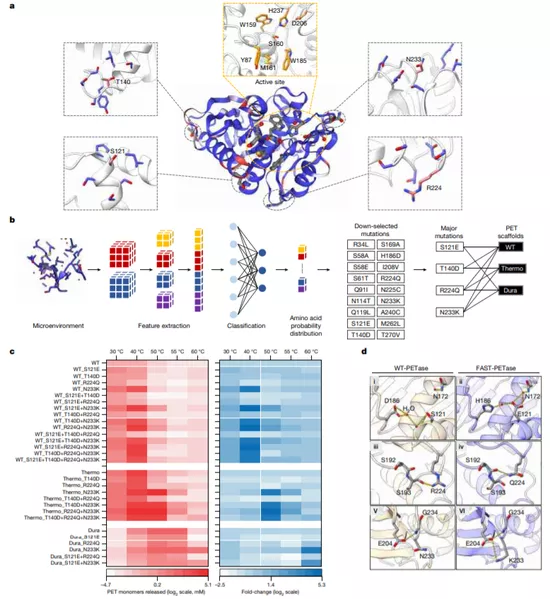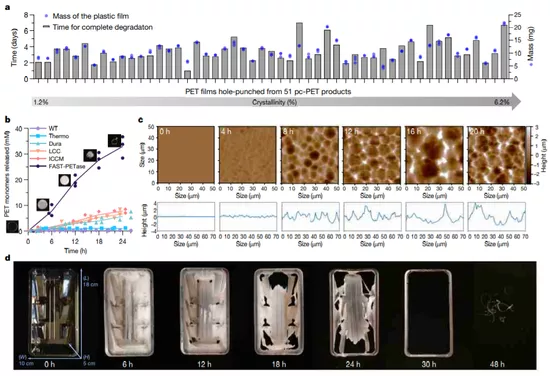Every year, the global production of plastics reaches a staggering 300 million tons, but when they end their mission, how to deal with these stable polymers becomes a difficult problem. Around the world, billions of tons of plastic waste are buried in landfills, polluting local soil and water sources. They can also appear in human blood, feces and even placenta in the form of micro plastics
How to alleviate the increasingly severe plastic crisis has become an extremely urgent challenge. In this regard, scientists are also looking for innovative countermeasures. Last year, a "nature" paper brought an important breakthrough: the research team at the University of California, Berkeley invented a degradable plastic: under the composting condition of 40 ℃, the plastic can be degraded in only two days.
A year later, another "nature" paper proposed solutions from different angles. Professor Hal Alper's team at the University of Texas at Austin used machine learning to transform an enzyme that can reduce the degradation time of plastics in centuries to hours to days. This key issue related to the future of mankind has ushered in the hope of cracking.

Globally, less than 10% of plastics are recycled. In the past ten years, a lot of progress has been made in the research of enzymes that degrade plastics. However, an outstanding problem is how to manufacture enzymes that can operate effectively at low temperature, so as to realize low-cost large-scale industrial applications.
What this study attempts to degrade is polyethylene terephthalate (PET), which is contained in the vast majority of plastic packaging materials we use every day. Pet accounts for 12% of the global solid waste. If it can be quickly degraded by enzymes and then polymerized or transformed into other products, it is expected to realize circular carbon economy and significantly reduce environmental pollution.
In nature, an enzyme called petase can degrade pet, but it also has obvious defects: it can only work in a specific pH and temperature range, and the reaction speed is limited. The plastic needs to be pretreated before degradation.
In this study, Professor Alper's team used a machine learning model to transform petase. The machine learning model can predict which mutations can make petase quickly degrade people's discarded plastic products at low temperature. Under the guidance of the model, the research team finally transformed a new enzyme: fast petase (functional, active, stable and tolerant petase).

This enzyme can depolymerize and degrade pet into small molecules under a series of different pH conditions below 50 ℃. Under some conditions, these plastics can be completely degraded into monomers in only 24 hours.
In order to test the effectiveness of fast petase in degrading different PET plastic products, this study used fast petase to degrade 51 kinds of untreated PET plastic products, including various plastic containers, polyester fibers and fabrics. As a result, all plastics are completely degraded within a week, and the fastest is only 1 ~ 2 days.

This enzyme can help enterprises recycle and reuse plastics at the molecular level, so as to reduce the adverse impact on the environment. Professor Alper said: "through this state-of-the-art recycling technology, industries can see endless possibilities."
Next, the research team plans to expand the production scale of fast-petase to lay the foundation for further industrial applications. The team is looking at several different uses: not only to clean up plastics in landfills and make industrial production greener, but also to use this enzyme to repair the environment and clean up contaminated areas.
This beautiful blue planet is getting worrisome white because of plastic pollution. Now, the birth of these emerging technologies is expected to turn the plastic pollution crisis around. We hope that the planet will return to its original and most beautiful color.
reference material:
[1] Lu, H。, Diaz, D.J。, Czarnecki, N.J。 et al。 Machine learning-aided engineering of hydrolases for PET depolymerization。 Nature 604, 662–667 (2022)。 https://doi.org/10.1038/s41586-022-04599-z
[2] Plastic-eating enzyme could eliminate billions of tons of landfill waste。 Retrieved Apr 27th, 2022 from https://www.eurekalert.org/news-releases/950900